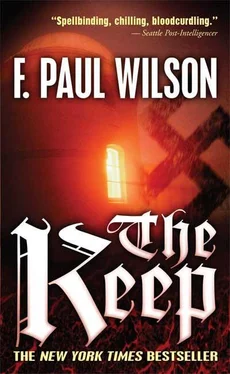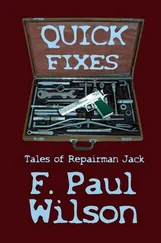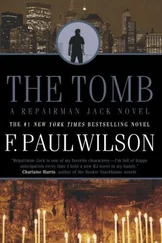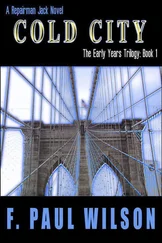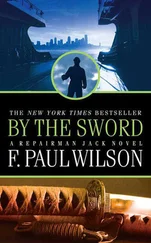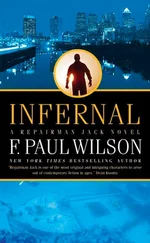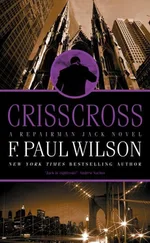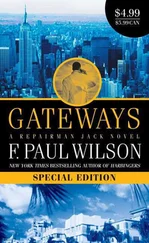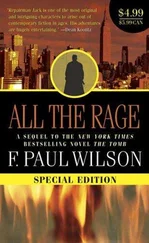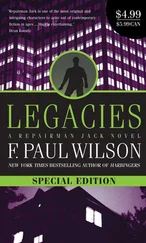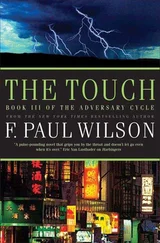F. Paul Wilson - The Keep
Здесь есть возможность читать онлайн «F. Paul Wilson - The Keep» весь текст электронной книги совершенно бесплатно (целиком полную версию без сокращений). В некоторых случаях можно слушать аудио, скачать через торрент в формате fb2 и присутствует краткое содержание. Жанр: Ужасы и Мистика, на английском языке. Описание произведения, (предисловие) а так же отзывы посетителей доступны на портале библиотеки ЛибКат.
- Название:The Keep
- Автор:
- Жанр:
- Год:неизвестен
- ISBN:нет данных
- Рейтинг книги:3 / 5. Голосов: 1
-
Избранное:Добавить в избранное
- Отзывы:
-
Ваша оценка:
- 60
- 1
- 2
- 3
- 4
- 5
The Keep: краткое содержание, описание и аннотация
Предлагаем к чтению аннотацию, описание, краткое содержание или предисловие (зависит от того, что написал сам автор книги «The Keep»). Если вы не нашли необходимую информацию о книге — напишите в комментариях, мы постараемся отыскать её.
The Keep — читать онлайн бесплатно полную книгу (весь текст) целиком
Ниже представлен текст книги, разбитый по страницам. Система сохранения места последней прочитанной страницы, позволяет с удобством читать онлайн бесплатно книгу «The Keep», без необходимости каждый раз заново искать на чём Вы остановились. Поставьте закладку, и сможете в любой момент перейти на страницу, на которой закончили чтение.
Интервал:
Закладка:
Yet Magda hesitated to insist that he rest. Lately, he had lost interest in everything, spending his days seated by the front window, staring out at the streets and seeing nothing. Doctors, when she could get one in to see him, had told her it was melancholia, common in his condition. Nothing to be done for it. Just give him aspirin for the constant ache, and codeine—when available—for the awful pains in every joint.
He had been a living dead man. Now he was showing signs of life. Magda couldn't bring herself to damp them. As she watched, he paused over De Vermis Mysteriis, removed his glasses, and rubbed a cotton-gloved hand over his eyes. Now perhaps was the time to pry him away from those awful books and persuade him to rest.
"Why didn't you tell them about your theory?" she asked.
"Eh?" He looked up. "Which one?"
"You told them you don't really believe in vampires, but that's not quite true, is it? Unless you finally gave up on that pet theory of yours."
"No, I still believe there might have been one true vampire—just one—from whom all the Romanian lore has originated. There are solid historical clues, but no proof. And without hard proof I could never publish a paper. For the same reason, I chose not to say anything about it to the Germans."
"Why? They're not scholars."
"True. But right now they think of me as a learned old man who might be of use to them. If I told them my theory they might think I was just a crazy old Jew and useless. And I can think of no one with a shorter life expectancy than a useless Jew in the company of Nazis. Can you?"
Magda shook her head quickly. This was not how she wanted the conversation to go. "But what of the theory? Do you think the keep might have housed..."
"A vampire?" Papa made a tiny gesture with his immobile shoulders. "Who can even say what a vampire might really be? There's been so much folklore about them, who can tell where reality leaves off—assuming there was some reality involved—and myth begins? But there's so much vampire lore in Transylvania and Moldavia that something around here must have engendered it. At its core, every tall tale has a kernel of truth."
His eyes were alight in the expressionless mask of his face as he paused thoughtfully. "I'm sure I don't have to tell you that there is something uncanny going on here. These books are proof enough that this structure has been connected with deviltry. And that writing on the wall... whether the work of a human madman or a sign that we are dealing with one of the moroi, the undead, is yet to be seen."
"What do you think?" she asked, pressing for some sort of reassurance. Her flesh crawled at the thought of the undead actually existing. She had never given such tales the slightest bit of credence, and had often wondered if her father had been playing some sort of intellectual game in his talk of them. But now...
"I don't think anything right now. But I feel we may be on the verge of an answer. It's not rational yet ... not something I can explain. But the feeling is there. You feel it, too. I can tell."
Magda nodded silently. She felt it. Oh, yes, she felt it.
Papa was rubbing his eyes again. "I can't read anymore, Magda."
"Come, then," she said, shaking off her disquiet and moving toward him. "I'll help you to bed."
"Not yet. I'm too wound up to sleep. Play something for me."
"Papa—"
"You brought your mandolin. I know you did."
"Papa, you know what it does to you."
"Please?"
She smiled. She could never refuse him anything for long. "All right."
She had catty-cornered the mandolin into the larger suitcase before leaving. It had been reflex, really. The mandolin went wherever Magda went. Music had always been central to her life—and since Papa had lost his position at the university, a major part of their livelihood. She had become a music teacher after moving into their tiny apartment, bringing her young students in for mandolin lessons or going to their homes to teach them piano. She and Papa had been forced to sell their own piano before moving.
She seated herself in the chair that had been brought in with the firewood and the bedrolls and made a quick check of the tuning, adjusting the first set of paired strings, which had gone flat during the trip. When she was satisfied, she began a complicated mixture of strumming and bare-fingered picking she had learned from the Gypsies, providing both rhythm and melody. The tune was also from the Gypsies, a typically tragic melody of unrequited love followed by death of a broken heart. As she finished the second verse and moved into the first bridge, she glanced up at her father.
He was leaning back in his chair, eyes closed, the gnarled fingers of his left hand pressing the strings of an imaginary violin through the fabric of his gloves, the right hand and forearm dragging an imaginary bow across those same strings but in only the minute movements his joints would allow. He had been a good violinist in his day, and the two of them had often done duets together on this song, she picking counterpoint to the soaring, tearful, molto rubato figures he would coax from his violin.
And although his cheeks were dry, he was crying.
"Oh, Papa, I should have known ... that was the wrong song." She was furious with herself for not thinking. She knew so many songs, and yet she had picked one that would most remind him that he could no longer play.
She started to rise to go to him and stopped. The room did not seem as well lit as it had a moment ago.
"It's all right, Magda. At least I can remember all the times I played along with you ... better than never having played at all. I can still hear in my head how my violin used to sound." His eyes were still closed behind his glasses. "Please. Play on."
But Magda did not move. She felt a chill descend upon the room and looked about for a draft. Was it her imagination, or was the light fading?
Papa opened his eyes and saw her expression. "Magda?"
"The fire's going out!"
The flames weren't dying amid smoke and sputter; they were merely wasting away, retreating into the charred wood. And as they waned, so did the bulb strung from the ceiling. The room grew steadily darker, but with a darkness that was more than a mere absence of light. It was almost a physical thing. With the darkness came a penetrating cold, and an odor, a sour acrid aroma of evil that conjured images of corruption and open graves.
"What's happening?"
"He's coming, Magda! Stand over by me!"
Instinctively, she was already moving toward Papa, seeking to shelter him even as she herself sought shelter at his side. Trembling, she wound up in a crouch beside his chair, clutching his gnarled hands in hers.
"What are we going to do?" she said, not knowing why she was whispering.
"I don't know." Papa, too, was trembling.
The shadows grew deeper as the light bulb faded and the fire died to wan glowing embers. The walls were gone, misted in impenetrable darkness. Only the glow from the coals, a dying beacon of warmth and sanity, allowed them to keep their bearings.
They were not alone. Something was moving about in that darkness. Stalking. Something unclean and hungry.
A wind began to blow, rising from a breeze to full gale force in a matter of seconds, howling through the room although the door and the shutters had all been pulled closed.
Magda fought to free herself from the terror that gripped her. She released her father's hands. She could not see the door, but remembered it having been directly opposite the fireplace. With the icy gale whipping at her, she moved around to the front of Papa's wheelchair and began to push it backward to where the door should be. If only she could reach the courtyard, maybe they would be safe. Why, she could not say, but staying in this room seemed like standing in a queue and waiting for death to call their names.
Читать дальшеИнтервал:
Закладка:
Похожие книги на «The Keep»
Представляем Вашему вниманию похожие книги на «The Keep» списком для выбора. Мы отобрали схожую по названию и смыслу литературу в надежде предоставить читателям больше вариантов отыскать новые, интересные, ещё непрочитанные произведения.
Обсуждение, отзывы о книге «The Keep» и просто собственные мнения читателей. Оставьте ваши комментарии, напишите, что Вы думаете о произведении, его смысле или главных героях. Укажите что конкретно понравилось, а что нет, и почему Вы так считаете.
